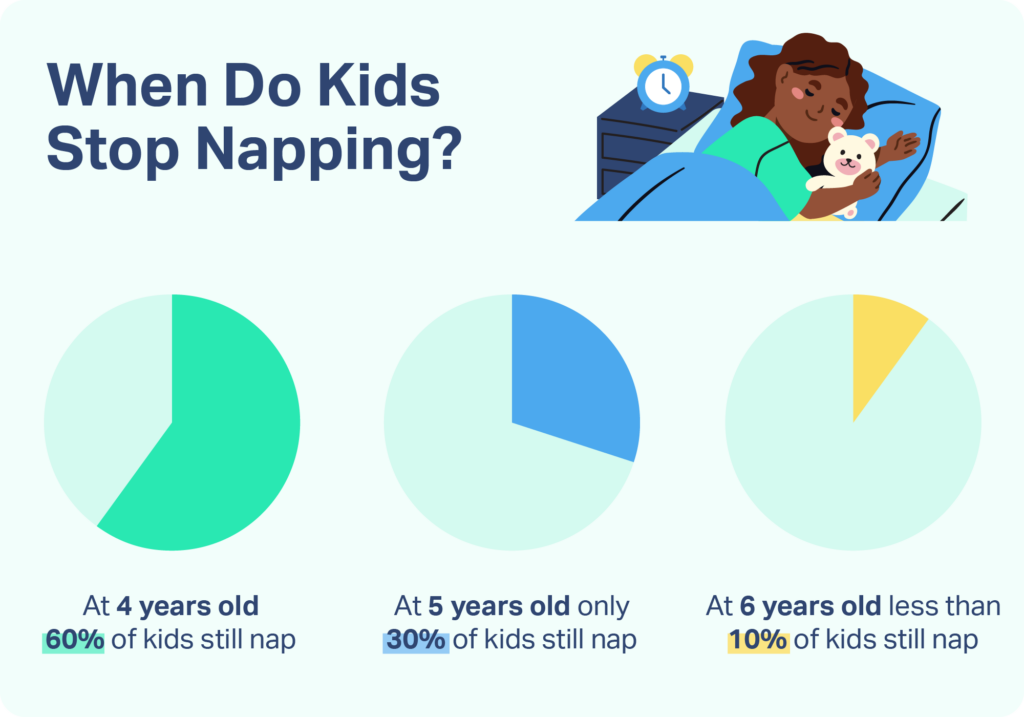
The Sleep Foundation editorial team is dedicated to providing content that meets the highest standards for accuracy and objectivity. Our editors and medical experts rigorously evaluate every article and guide to ensure the information is factual, up-to-date, and free of bias.
Table of Contents
The American Academy of Sleep Medicine (AASM) offers recommendations Trusted Source National Library of Medicine, Biotech Information The National Center for Biotechnology Information advances science and health by providing access to biomedical and genomic information. View Source for children’s total daily sleep needs by age group. These recommendations can serve as a general target, but it is important to remember that a healthy amount of sleep may vary among individual babies and kids based on a number of factors, including their temperament and developmental differences.
| Age Group | Age Range | Recommended hours of sleep per 24 hours |
|---|---|---|
| Infant | 4-12 months | 12-16 hours (including naps) |
| Toddler | 1-2 years old | 11-14 hours (including naps) |
| Preschool | 3-5 years old | 10-13 hours (including naps) |
| School-age | 6-12 years old | 9-12 hours |
Babies spend the majority of their day sleeping. The typical amount of time that babies sleep depends on their age.
Babies spend more than half of their time sleeping because this is a period of substantial growth. Sleep allows the brain to develop, building networks that facilitate thinking and learning as well as the formation of behavior. Sleep and nutrition also allow a baby to develop physically, growing bigger and acquiring better motor skills.

our partner at sleepdoctor.com
“Life-changing! My anxiety about my son’s sleeping habits were immediately reduced after talking to Sara. She went above and beyond to tailor a schedule to our goals, answer our questions, keep us on track, and check in to encourage us when we just thought we couldn’t do it anymore.”
Rachael B. – Verified Customer
Specialized coaching for babies, toddlers, preschoolers/kindergarteners, and school-age children.
Personalized sleep training plan based on the specific situation and needs of your family.
Access to pediatric sleep consultants who will answer any questions you have as quickly as possible.
It is very common for babies to nap and obtain a meaningful portion of their total sleep during the day. Newborns often nap during the day, with each nap lasting between one and four hours. Although total nap time decreases as they get older, it is typical for infants to continue to nap for 2 to 3 hours or more each day.
This napping is not just normal but also beneficial. Research has found that frequent naps allow infants to consolidate specific memories. In addition, naps enable a more generalized memory that is important for learning and brain development.
In general, it is thought that babies start to consolidate their nightly sleeping period at around 5 or 6 months of age, making it more likely for them to sleep through the night. At the same time, research has found that the date of this milestone can vary significantly. In one study, a considerable number of 6- and 12-month-old babies did not sleep either 6 or 8 hours consecutively Trusted Source National Library of Medicine, Biotech Information The National Center for Biotechnology Information advances science and health by providing access to biomedical and genomic information. View Source at night:
| Age | Percent Not Sleeping 6+ Hours Consecutively | Percent Not Sleeping 8+ Hours Consecutively |
|---|---|---|
| 6 months | 37.6% | 57.0% |
| 12 months | 27.9% | 43.4% |
While caregivers often worry if their child takes longer to start sleeping through the night, this same study found that there were no detectable impacts on a child’s physical or mental development if they were not able to sleep for these longer consecutive periods as an infant.
Over time, you can expect an infant to start sleeping for longer segments at night, but to date, the importance of sleeping through the night has not been shown to be more significant for infants than total daily sleep time.
That said, there are steps that parents and caregivers can take to encourage longer periods of consecutive sleep at night, such as sleep training. Any concerns about frequent nighttime awakenings should be discussed with a pediatrician.
Babies that are born prematurely often need even more sleep than babies born at full term. It is not uncommon for premature babies to spend around 90% of their time asleep Trusted Source National Library of Medicine, Biotech Information The National Center for Biotechnology Information advances science and health by providing access to biomedical and genomic information. View Source . The exact amount that a preterm newborn will sleep can depend on how early they were born and their overall health.Over the course of the first 12 months, a premature baby’s sleep patterns come to resemble those of full-term infants Trusted Source National Library of Medicine, Biotech Information The National Center for Biotechnology Information advances science and health by providing access to biomedical and genomic information. View Source , but for an initial period, they often have more total sleep, lighter sleep, and less consistent sleep overall.
There is some debate about how and whether the method of feeding affects a baby’s sleep. While some research has found more nighttime awakenings Trusted Source National Library of Medicine, Biotech Information The National Center for Biotechnology Information advances science and health by providing access to biomedical and genomic information. View Source in babies who are breastfed, other studies have found little difference Trusted Source National Library of Medicine, Biotech Information The National Center for Biotechnology Information advances science and health by providing access to biomedical and genomic information. View Source between sleep patterns of breastfed and formula-fed babies.
Although not firmly established, there is some evidence Trusted Source National Library of Medicine, Biotech Information The National Center for Biotechnology Information advances science and health by providing access to biomedical and genomic information. View Source that babies who are breastfed may have better sleep during their preschool years. More research is needed to understand the relationship between feeding and sleep in babies.
Parents who have concerns about their baby’s sleep should start by speaking with a pediatrician. Keeping a sleep diary to track your child’s sleep patterns may help the doctor determine if your baby’s sleep has a normal pattern or may reflect a potential sleeping problem.
For babies who struggle to sleep through the night, behavioral changes may encourage longer sleep sessions. For example, reducing the speed of response to awakenings may encourage self-soothing, and gradually pushing back bedtime may create more sleepiness that helps a baby stay asleep longer.
It may also be beneficial to improve sleep hygiene by creating a consistent sleep schedule and routine and ensuring that the baby has a calm and quiet environment for sleep. Infant sleep hygiene should also account for important safety measures to prevent the risk of suffocation and sudden infant death syndrome (SIDS).
Children’s sleep needs change significantly as they get older. As they move from toddlers to school age, their sleep becomes increasingly similar to that of adults. In this process, the sleep requirements for young children decline, and that is reflected primarily in a decreased amount of time spent napping during the day.
Even though kids sleep for fewer hours than babies, sleep remains critical to their overall health and development. Lack of sufficient sleep at a young age has been correlated with problems with weight, mental health, behavior, and cognitive performance.
For many kids, it is normal to take naps, especially when they are toddlers and preschool-aged. During these years, napping may continue to provide benefits for memory and thinking. During early childhood, naps become both shorter and less frequent. This may occur naturally or as a result of schedules for school or child care.

Although many children stop napping by age 6, remember that nap preferences can be different for every child. In preschools with scheduled nap time, some children sleep easily, but others — up to 42.5% Trusted Source National Library of Medicine, Biotech Information The National Center for Biotechnology Information advances science and health by providing access to biomedical and genomic information. View Source in one study — fall asleep only sometimes or not at all.
Some older children may still be inclined to nap and can benefit from doing so. In a study in China, children in grades 4 through 6 who took frequent naps after lunch showed signs of better behavior Trusted Source National Library of Medicine, Biotech Information The National Center for Biotechnology Information advances science and health by providing access to biomedical and genomic information. View Source , academic achievement, and overall happiness.
The existing research about napping and optimal timing of sleep episodes is inconclusive and acknowledges that what is best for one child can change over time and may not be what is best for another child of the same age. For this reason, parents, teachers, and child care workers may be able to best encourage optimal sleep for kids by being flexible and understanding about naps.
It is estimated that up to 50% of children Trusted Source National Library of Medicine, Biotech Information The National Center for Biotechnology Information advances science and health by providing access to biomedical and genomic information. View Source have trouble sleeping. While the nature of sleeping challenges vary, parents and caregivers should talk with children about sleep and raise the issue with their pediatrician if there are signs of severe or persistent problems, including insomnia.
Helping children sleep often starts with creating a bedroom environment that is peaceful, quiet, and comfortable. Finding the best mattress for your child’s needs and minimizing blue light, such as from TV or other electronic devices, can make it easier for children of any age to get consistent sleep.
Establishing healthy sleep habits, including a stable sleep schedule and bedtime routine, can reinforce the importance of bedtime and cut down on night-to-night variability in sleep. Giving children an opportunity to use up their energy during the day and to unwind before bedtime can make it easier for them to fall asleep and stay asleep through the night.
Related News